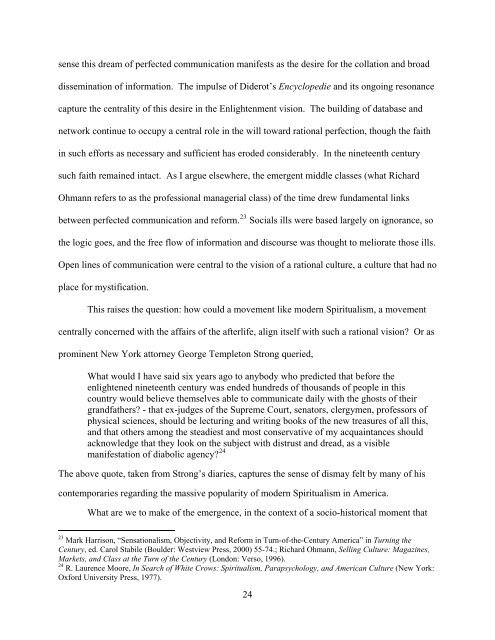A Genealogy of the Extraterrestrial in American Culture
A Genealogy of the Extraterrestrial in American Culture
A Genealogy of the Extraterrestrial in American Culture
Create successful ePaper yourself
Turn your PDF publications into a flip-book with our unique Google optimized e-Paper software.
sense this dream <strong>of</strong> perfected communication manifests as <strong>the</strong> desire for <strong>the</strong> collation and broad<br />
dissem<strong>in</strong>ation <strong>of</strong> <strong>in</strong>formation. The impulse <strong>of</strong> Diderot’s Encyclopedie and its ongo<strong>in</strong>g resonance<br />
capture <strong>the</strong> centrality <strong>of</strong> this desire <strong>in</strong> <strong>the</strong> Enlightenment vision. The build<strong>in</strong>g <strong>of</strong> database and<br />
network cont<strong>in</strong>ue to occupy a central role <strong>in</strong> <strong>the</strong> will toward rational perfection, though <strong>the</strong> faith<br />
<strong>in</strong> such efforts as necessary and sufficient has eroded considerably. In <strong>the</strong> n<strong>in</strong>eteenth century<br />
such faith rema<strong>in</strong>ed <strong>in</strong>tact. As I argue elsewhere, <strong>the</strong> emergent middle classes (what Richard<br />
Ohmann refers to as <strong>the</strong> pr<strong>of</strong>essional managerial class) <strong>of</strong> <strong>the</strong> time drew fundamental l<strong>in</strong>ks<br />
between perfected communication and reform. 23 Socials ills were based largely on ignorance, so<br />
<strong>the</strong> logic goes, and <strong>the</strong> free flow <strong>of</strong> <strong>in</strong>formation and discourse was thought to meliorate those ills.<br />
Open l<strong>in</strong>es <strong>of</strong> communication were central to <strong>the</strong> vision <strong>of</strong> a rational culture, a culture that had no<br />
place for mystification.<br />
This raises <strong>the</strong> question: how could a movement like modern Spiritualism, a movement<br />
centrally concerned with <strong>the</strong> affairs <strong>of</strong> <strong>the</strong> afterlife, align itself with such a rational vision? Or as<br />
prom<strong>in</strong>ent New York attorney George Templeton Strong queried,<br />
What would I have said six years ago to anybody who predicted that before <strong>the</strong><br />
enlightened n<strong>in</strong>eteenth century was ended hundreds <strong>of</strong> thousands <strong>of</strong> people <strong>in</strong> this<br />
country would believe <strong>the</strong>mselves able to communicate daily with <strong>the</strong> ghosts <strong>of</strong> <strong>the</strong>ir<br />
grandfa<strong>the</strong>rs? - that ex-judges <strong>of</strong> <strong>the</strong> Supreme Court, senators, clergymen, pr<strong>of</strong>essors <strong>of</strong><br />
physical sciences, should be lectur<strong>in</strong>g and writ<strong>in</strong>g books <strong>of</strong> <strong>the</strong> new treasures <strong>of</strong> all this,<br />
and that o<strong>the</strong>rs among <strong>the</strong> steadiest and most conservative <strong>of</strong> my acqua<strong>in</strong>tances should<br />
acknowledge that <strong>the</strong>y look on <strong>the</strong> subject with distrust and dread, as a visible<br />
manifestation <strong>of</strong> diabolic agency? 24<br />
The above quote, taken from Strong’s diaries, captures <strong>the</strong> sense <strong>of</strong> dismay felt by many <strong>of</strong> his<br />
contemporaries regard<strong>in</strong>g <strong>the</strong> massive popularity <strong>of</strong> modern Spiritualism <strong>in</strong> America.<br />
What are we to make <strong>of</strong> <strong>the</strong> emergence, <strong>in</strong> <strong>the</strong> context <strong>of</strong> a socio-historical moment that<br />
23 Mark Harrison, “Sensationalism, Objectivity, and Reform <strong>in</strong> Turn-<strong>of</strong>-<strong>the</strong>-Century America” <strong>in</strong> Turn<strong>in</strong>g <strong>the</strong><br />
Century, ed. Carol Stabile (Boulder: Westview Press, 2000) 55-74.; Richard Ohmann, Sell<strong>in</strong>g <strong>Culture</strong>: Magaz<strong>in</strong>es,<br />
Markets, and Class at <strong>the</strong> Turn <strong>of</strong> <strong>the</strong> Century (London: Verso, 1996).<br />
24 R. Laurence Moore, In Search <strong>of</strong> White Crows: Spiritualism, Parapsychology, and <strong>American</strong> <strong>Culture</strong> (New York:<br />
Oxford University Press, 1977).<br />
24















